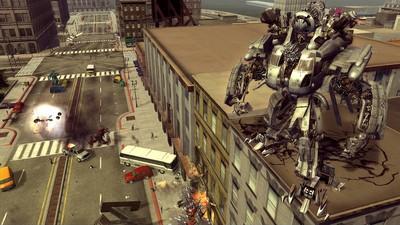Less Than Meets the Eye

I suppose I should acknowledge I rarely watched the "Transformers" cartoon. But that shouldn’t influence my review of "Transformers: The Game." A game should stand on its own two feet, or on its own four wheels, or whatever a Transformer has.
If you’ve ignored the "robots in disguise" mythology as I have for decades, it’s essentially the story about cool cars that turn into big robot aliens from outer space that punch and shoot each other (or something-something).
That seems clever, but what’s intriguing about the cartoon is its contextual underbelly and literary parallelisms. "Transformers" debuted in 1984, the year made famous by George Orwell in his novel, "1984," his cautionary, futuristic tale about government power gone extreme.
Orwell’s satirical yarn taught us to fret that the English-language state could turn into a totalitarian regime. Orwell, writing in 1948, wanted old America to rebel against the threat at the time, the communist Soviet system.
My whole life, I’ve thought Orwell picked on the wrong futuristic concern. Communism was doomed.
It’s corporations (which aren’t definitely evil) that are expanding, taking over the world and instilling limits on garden-variety freedoms like health care access and vacation time, more than government (which isn’t definitely evil) does on a daily basis. And don’t even get me started on homeowners’ associations (pure evil).
It’s peculiar that while people discussed Orwell in 1984, "Transformers" didn’t gibe with Orwell much at all. It let us ponder a future where robotic consumer goods count as a life form, and the life forms are stuck in some sort of huge energy crisis. Or something-something.
Anyhow, the cartoon yo-yoed many narratives, whereas the movie focuses more narrowly on a guy named Sam and his classic Camaro, which (gadzooks!) just happens to turn into this big robot thing with eyes, and it kills evil car-robots that also have eyes.
"Transformers: The Game" follows this cinematic thread. The plot is threadbare. You try not to drive your Camaro over people. You push a button to transform into a machine-guy.
As a robot, you shoot missiles and stuff, and you punch and kick rivals. Quite a few reviewers have creamed the game for not living up to the cartoon, for not looking great, and for feeling repetitive. I would add that the driving physics are stinkwaddy.
Although, I do think the game is getting shortchanged a little. The robot vs. robot fighting mechanics are pretty cool at first (but yes, it’s redundant). And on my Xbox 360, the visuals are just fine. Not great, but doable.
You also can play as the good guys (Autobots) or the villains (Decepticons), and you get a fairly different experience with either choice. The big down side is it’s not super exciting to punch and kick Transformers, over and over. And you can’t play online.
To recap the summer so far, we gamers have been disappointed by titles based on "Spider-Man 3" (fun but ridiculously hard halfway through), "Harry Potter and the Order of the Phoenix" (a sweet nothing) and "Fantastic Four: Rise of the Silver Surfer" (a piffle).
Now here’s "Transformers: The Game." As a longtime player, I’m tempted to wonder why these games even get made. But oh right, they make tons of cash. For corporations.
("Transformers: The Game" retails for $60 for Xbox 360 and PS 3; $50 for Wii; $40 for PS 2 and PSP; $30 for DS — Plays dull. Looks OK. Easy to moderately challenging. Rated "T" for violence. One star out of four. The PSP and DS games are different narratives.)